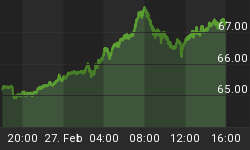Dallas Federal Reserve Bank President Richard Fisher, using a baseball analogy, said the Fed is in its 8th inning, and will raise rates one more time at its next meeting. A standard baseball game has 9 innings. Then, the Fed may or may not raise rates further, "go into overtime." Fisher implies that the Fed is pretty much done raising rates. Fisher is new to his post and may have talked more broadly than he was supposed to; however, his statement was rehearsed, and the markets take it seriously.
We have long argued that the U.S. economy is too leveraged to allow the Fed to aggressively raise rates to curb the housing bubble and inflation that is creeping through the supply chain. Any forceful action would cause the housing bubble to collapse and throw the economy into a severe recession. For now, it looks like the Fed opts for continued growth rather than correcting imbalances. Inflation that has been creeping up will be fostered and entrenched in more and more sectors of the economy.
In the meantime, the yield curve is flattening. On the one hand, we have a slowing economy; on the other hand, we have an accommodating monetary policy that has contributed to numerous capital misallocations ("bubbles" in modern parlance). As long as the Fed is artificially boosting the economy, we are setting ourselves up for an ever more severe adjustment process when it does happen. Richard Russell dug up the following quote from Alan Greenspan - from 1996:
"The excess credit which the Fed pumped into the economy spilled over into the stock market -- triggering a fantastic speculative boom. Belatedly, the Federal Reserve officials attempted to sop up the excess reserves and finally succeeded in braking the boom. But it was too late: by 1929, the speculative imbalances had become so overwhelming that the attempt precipitated a sharp retrenching and consequent demoralizing of business confidence." Alan Greenspan, The Objectivist, 1966
One thing that certainly has not changed is the Fed's confidence to steer this economy. Market forces will prevail in the end - the question is only which valve will have to give. When the Fed manages the entire yield curve, it may well be the dollar that has to give sooner or later. For now, the dollar enjoys short-term relief.















